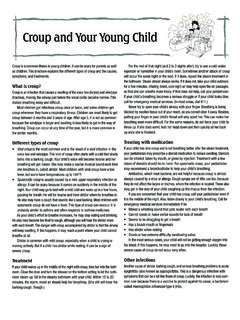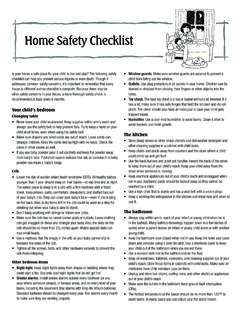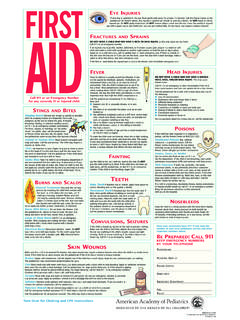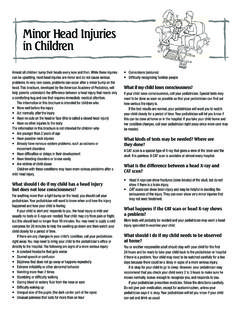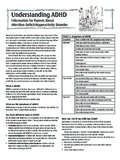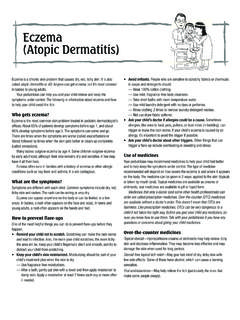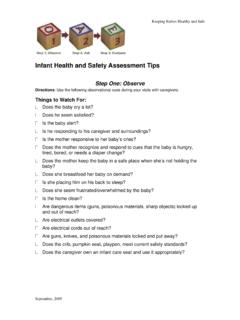Transcription of Sleep Problems in Children - Pediatric Spec
1 Sleep Problems are very common during the fi rst few years of life. Problems may include waking up during the night, not wanting to go to Sleep , night-mares, sleepwalking, and bedwetting. All Children differ in how much Sleep they need, how long it takes them to fall asleep, and how easily they wake up. Parents can help their Children develop good Sleep habits, even at an early age. Read on to fi nd out Babies do not have regular Sleep cycles until about 6 months of age. While newborns Sleep about 16 to 17 hours per day, they may only Sleep 1 or 2 hours at a time. As babies get older, they need less Sleep . However, different babies have different Sleep needs. It is normal for a 6-month-old to wake up during the night but go back to Sleep after a few minutes. Here are some suggestions that may help your baby (and you) Sleep better at Keep your baby calm and quiet when you feed or change her during the night.
2 Try not to stimulate or wake her too Make daytime playtime. Talking and playing with your baby during the day will help lengthen her awake times. This will help her Sleep for longer periods during the night. 3. Put your baby to bed when drowsy but still awake. This will help your baby learn to fall asleep on her own in her own bed. Holding or rocking her until she is completely asleep may make it hard for her to go back to Sleep if she wakes up during the night. 4. Wait a few minutes before responding to your child s fussing. See if she can fall back to Sleep on her own. If she continues to cry, check on her, but don t turn on the light, play with her, or pick her up. If she gets frantic or is unable to settle herself, consider what else might be bothering her. She may be hungry, wet or soiled, feverish, or otherwise not feeling and preschoolersMany parents fi nd their toddler s bedtime to be the hardest part of the day.
3 Children this age often resist going to Sleep , especially if they have older siblings who are still awake. Use the following tips to help your toddler develop good Sleep habits:1. Set up a quiet routine before bedtime to help your child understand that it will soon be time to go to Sleep . Use this time to read him a story, listen to quiet music, or give him a bath. It may be tempting to play with your child before bed. However, active play may make your child too excited to Sleep . 2. Be consistent. Make bedtime the same time every night. This helps your child know what to expect and helps him establish healthy Sleep Allow your child to take a favorite thing to bed each night. It s okay to let your child Sleep with a teddy bear, special blanket, or some other favorite toy. These often help Children fall asleep especially if they wake up during the night.
4 Make sure the object is safe. Look for ribbons, buttons, or other parts that may be choking hazards. Stuffi ng or pellets inside stuffed toys can also be Make sure your child is comfortable. He may like to have a drink of water, a light left on, or the door left slightly open. Try to handle your child s needs before bedtime so that he doesn t use them to avoid going to Do not let your child Sleep in the same bed with you. This can make it harder for him to fall asleep when he is Do not return to your child s room every time he complains or calls out. Instead, try the following: Wait several seconds before answering and make your response time longer each time he calls. This will give him a chance to fall asleep on his own. Reassure your child that you are there. If you need to go into the room, do not turn on the light, play with him, or stay too long.
5 Move farther from your child s bed every time you go in, until you can reassure him verbally without entering his room. Remind him each time he calls that it s time to go to Give it time. Helping your child develop good Sleep habits can be a challenge and it is normal to get upset when a child keeps you awake at night. Try to be understanding. A negative response by a parent can sometimes make a Sleep problem Problemsin ChildrenSIDSS udden infant death syndrome (SIDS) is the sudden, unexplained death of a baby younger than 1 year. To lower the risk of SIDS, all healthy babies should Sleep on their backs both at nap time and at night. Other ways to help prevent SIDS include Use a safety-approved crib with a fi rm mattress and a fi tted sheet. The safest place for your baby to Sleep is in the room where you Sleep , but not in your bed.
6 Keep pillows, quilts, comforters, sheepskins, pillow-like bumper pads, and stuffed toys out of your baby s crib. Put your baby in light Sleep clothing and keep the room at a comfortable temperature. Offer your baby a pacifi er if your baby will take it. If you are breast-feeding, wait until your baby is 1 month old before using a pacifi er. Do not allow smoking around your Sleep problemsThere are many things that can cause a child to wake up during the night. Most of these happen when Children are overtired or under stress. Keeping your child on a regular Sleep schedule or increasing the amount of Sleep your child gets may help prevent many of these Problems . If your child s Sleep Problems persist or get worse, talk with your are scary dreams that often happen during the second half of the night when dreaming is most intense. Children may wake up crying or feeling afraid and may have trouble falling back to Sleep .
7 What you can do Go to your child as quickly as possible. Assure her that you are there and will not let anything harm her. Encourage her to tell you what happened in the dream. Remind her that dreams are not real. Allow her to keep a light on if it makes her feel better. Once your child is ready, encourage her to go back to Sleep . See if there is something that is scaring your child , like shadows. If so, make sure they are terrorsNight terrors occur most often in toddlers and preschoolers and take place during the deepest stages of Sleep . During a night terror, your child might Cry uncontrollably. Sweat, shake, or breathe fast. Have a terrifi ed, confused, or glassy-eyed look. Thrash around, scream, kick, or stare. Not recognize you or realize you are there. Try to push you away, especially if you try to hold him.
8 While night terrors can last as long as 45 minutes, most are much shorter. Most Children fall right back to Sleep after a night terror because they actually have not been awake. Unlike a nightmare, a child will not remember a night terror. What you can do Stay calm. Night terrors are often more frightening for the parent than the child . Do not try to wake your child . Make sure your child cannot hurt himself. If he tries to get out of bed, gently restrain him. Remember, after a short time, your child will probably relax and Sleep quietly again. If your child has night terrors, be sure to tell babysitters what they are and what to do. If night terrors persist, talk with your and Sleep talkingLike night terrors, sleepwalking and Sleep talking happen when a child is in a deep Sleep . While sleepwalking, your child may have a blank, staring face.
9 She may not respond to others and may be very diffi cult to wake up. Most sleepwalkers return to bed on their own and do not remember getting out of bed. Sleepwalking tends to run in families. It can even occur several times in one night among older Children and teens. What you can do Make sure your child doesn t hurt herself while sleepwalking. Clear the bedroom of things your child could trip or fall on. Lock outside doors so your child cannot leave the house. Block stairways so your child cannot go up or down. Do not try to wake your child when she is sleepwalking or Sleep talking. Gently lead her back to bed and she will probably settle down on her (also called enuresis)enuresis)enuresisBedwetting at night is very common among young Children . Although all of the causes of bedwetting are not fully understood, the following are some that are possible: Your child s bladder cannot hold urine for a full night.
10 Your child is a deep sleeper and can t wake up in time to use the toilet. Your child s body makes too much urine at night. Your child is constipated (this can put pressure on the bladder). Your child has a minor illness, is overly tired, or is responding to changes or stresses going on at home. There is a family history of bedwetting. (Most Children that wet the bed have at least one parent who had the same problem as a child .) What you can do Do not blame or punish your child for wetting the bed. Reassure him that it will get better in time. Have your child use the toilet before going to bed. Avoid giving your child fl uids just before bedtime. Put a rubber or plastic cover over the mattress to protect against wetness and odors. Keep bedding clean. Encourage your child to help change the wet sheets. This will help teach responsibility and avoid the embarrassment of having other family members know about the problem every time it happens.

